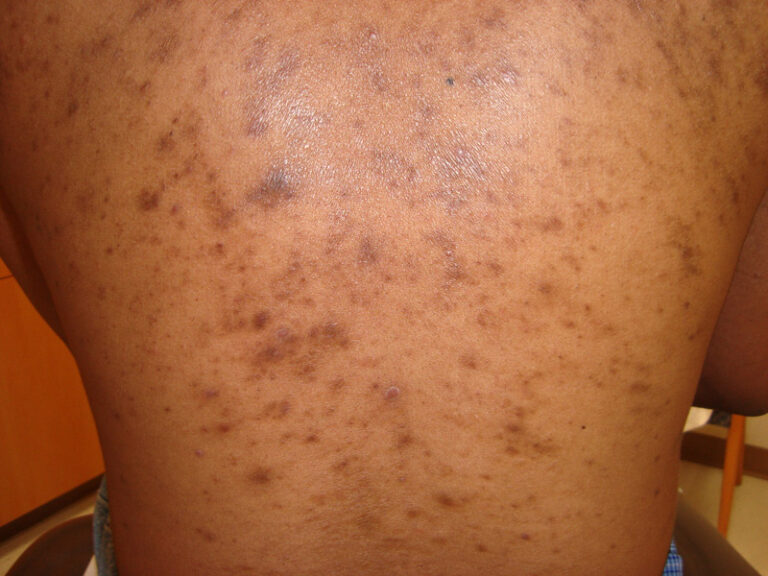What is post-inflammatory Hyperpigmentation?
Post-inflammatory Hyperpigmentation (PIH) is a common skin condition that occurs after inflammation or injury to the skin. An acne wound on the skin triggers an inflammatory response. This inflammatory response leads to abnormal production of melanin (the pigment that gives skin its color). Our skin produces melanin when it is wounded or experienced damage as a way of protecting itself from UV rays. Melanin absorbs most of the UV radiation that hits our skin. The buildup of melanin in the wounded area, appears darker usually (black or brown) patch or spot, depending on our skin tone and depth of discoloration
PIH affects both women and men. It occurs in all skin types, although it tends to be more common and severe for darker skin tones. This is due to the presence of excess melanin in skin of color.
What exactly causes post-inflammatory Hyperpigmentation?
PIH develops when a wound, rash, or pimple causes inflammation on the skin. As the skin heals, it stimulates excess melanin production. It is the excess melanin that darkens and discolors the skin. We all have almost the same number of melanocytes. However, people with darker skin color make more melanin than others, which means that when melanocytes are triggered, the flare is more noticeable and takes longer to fade.
In what way can you prevent Post Inflammatory Hyperpigmentation on dark skin?
Since people with darker skin tone are more prone to developing (PIH), it is essential to take appropriate steps to protect our skin and avoid unnecessarily irritating melanocytes. Prevention of post-Inflammatory Hyperpigmentation starts with avoiding the causes. To prevent ourselves from post-Inflammatory Hyperpigmentation, one should:
- Wear sunscreen with SPF 30 or higher every day and try to reapply throughout the day. Sun protection is the most crucial step in preventing Hyperpigmentation and allows the spots to fade quickly.
- Acne, which is the primary cause of PIH, is essential to have a skincare regimen tailored to your specific skin type, issue, and need. Choose s cleanser, moisturizer with SPF, and night cream that will address your skin needs, so that you can prevent pimples, dark spots, and acne scars from starting.
- Use gentle skincare products that will not irritate the skin.
- Do not pick or pop your pimple. Picking at an active acne lesion increases the chances of leaving behind a dark spot. Leave it alone and let it heal over time.
- Wear protective clothing like long-sleeved, sunglasses and hats with brims when going out.
Ways that help treat post- Inflammatory Hyperpigmentation on dark skin tone?
Is your skin susceptible to post Inflammatory Hyperpigmentation? If the answer is yes, try these anti-inflammatory and brightening ingredients.
Exfoliation: You can use exfoliating treatments twice a week. Use a gentle exfoliate to help the dark spots fade faster. Exfoliation increases the speed at which your skin cells renew. This means you are shading off old skin cells to reveal new skin cells without dark spots and Hyperpigmentation. For dark skin type, it is preferable to use chemical exfoliants in low concentration.
Vitamin C Serum: Another way to effectively treat post-inflammatory Hyperpigmentation dark complexion is to use Vitamin C serum (a powerful antioxidant); it protects your skin from damaging UV rays and environmental pollution. Post Inflammatory hyperpigmentation will also benefit from the properties of Vitamin C serums.
Protect your skin from the sun: An essential step of all is to protect your skin from UV rays. The previous steps would be useless without sunscreen. Do not start your day without sunscreen. Always wear sunscreen if you are going outside for an extended period. UV rays are the enemy of dark spots and acne scars. They trigger inflammation and increase melanin production, causing dark spots and scars to become darker.
Vitamin A: you will find this one as retinol or anything with Retin. One of the most crucial ingredients in skincare. It protects the skin against UV damage and helps to fade the appearance of Hyperpigmentation.
Finally, when it comes to preventing and treating post-Inflammatory Hyperpigmentation on rich complexion, less is always more. Always remember the slightest irritating skincare Ingredient; practices could lead to dark spots or PIH.

